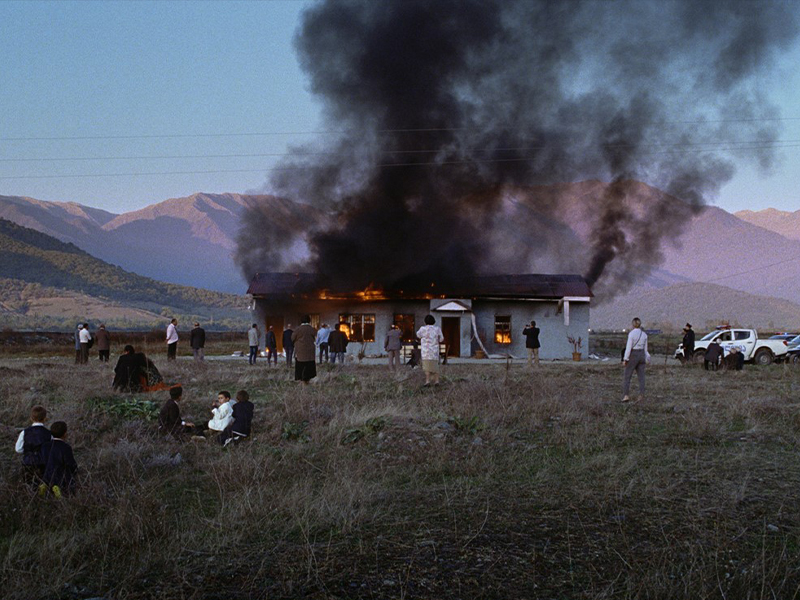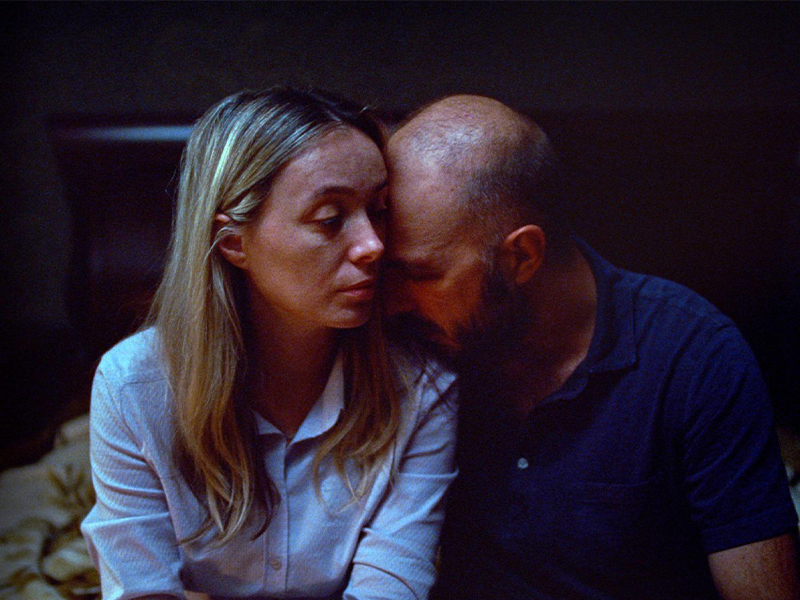IFFR 2021 – Beginning. Shock Value
Beginning, the debut film of Georgian filmmaker Dea Kulumbegashvili, has already made the rounds on the international festival circuit, nabbing important prizes along the way (it was part of the official selection of Cannes, awarded with the FIPRESCI prize at Toronto, four major awards won at San Sebastian, and so on); now that it has been screened by IFFR, Beginning can be streamed for free on Mubi in a few select countries (UK, Germany). Despite its apparent accessibility and of the collective praise that it won, Beginning is not at all a film that is easy to digest – the strong hand with which Kulumbegashvili juggles between divine grace and moral decay is at times merciless, just as how she keeps her protagonist locked in countless cages which she is never freed from.

The film’s beginning itself is like a punch to the gut – set at the back of a classroom, the camera, in a wide and static shot, records all sorts of adult figures who come and go, or who take a seat; after several minutes of coming and going, David (Rati Oneli) begins to hold a sermon in front of the audience. They are a couple of people belonging to the Jehovah’s Witnesses community, and the sermon regards the story of Abraham and his divine sacrifice. Kulumbegashvili accumulates enough time for the spectators to enter the atmosphere and to dissolve into the shot, only for her to literally shake them up, a procedure that she will constantly reiterate throughout the film: the classroom is attacked with two subsequent Molotov Cocktails thrown in from the outside, and the audience is helplessly trapped in this part of the spectacle, witnessing people that are trying to extinguish the fire with their own clothes. The fire slowly ends up consuming the entire building, and children keep on circling the burning building until sundown, while, at a distance, Yana (Ia Sukhitashvili), David’s wife, is standing next to a tree, unmoving and alienated, listening to the rising flames. The calmness with which Yana is constantly followed is synonymous with the sadness of unspoken words: she’s a former actress that has left her job behind to become a teacher and a wife, she belongs to two minorities (both religious and social) and is a mother who is oftentimes reproached for being overprotective. The film tracks her as she’s stumbling, in the search for her increasingly fragile identity (both in regards to faith, but also in the unity of her family, destroyed by the ongoing abuses of strangers). The camera lingers several times on her stillness – in the film’s most valuable sequence (which, not unwittingly, is also a decision that deviates from the script), Yana falls asleep on a bed of leaves, rays of light strewn across her body, while her toddler is pulling on her coat in order to wake her up. After a dreamlike trill of chirping birds is heard, the sound phases out completely, as if the woman has melted into the structure of the soil lying beneath her body. In a reverse shot, the child is looking at her from a distance, small, hidden in the drabbest bushes imaginable, to the disconcerting sound of buzzing insects – is this the heaven that his mother was experiencing earlier? These kinds of moments have the cumulative effect on which Chantal Akerman was counting on in Jeanne Dielman. Even so, Beginning is not a film that completely exonerates or even embraces its protagonist, and from a certain point onward, her gestures are no longer recognizable to the audience but are much rather surprises that bank on shock value. The final tone will ring on the same grim note, of a fly trapped in patriarchy’s spider web.

The format with which Kulumbegashvili follows her characters (1:33:1, a square used to limit the movement of the actors, making them seem as goldfish trapped in a bowl) contributes to the sensation of lack of control, both in the freedom of Yana’s reactions, whose movements are almost always graceful and soft, seemingly sedated, as well as in the limitation of the audience’s possibilities. For example, critic Devika Girish sees this choice as an affirmation of the viewer’s status as a witness that lacks any power, who is obligated to observe everything from a distance; all across the film, Kulumbegashvili sets her camera in motion for only a handful of time (and, of course, each of these moments is a panorama that prefaces a paradigmatic change within the dramaturgy of the film). This kind of directorial mastery (which can only resuscitate the pragmatic formulas of the kind we witnessed in the Romanian New Wave) gives the impression of a demonstrational kind of artistic superiority. Beyond the gut punches that the film delivers at regular intervals (an idyllic landscape turns into the backdrop of a rape, a welcoming home becomes a torturous space) and its aesthetic excellence, Beginning ends on a note which leaves spectators with a somewhat artificial mix of joy and frustration: how much life is there left to live for this woman without means? What is her point of view? If Akerman constructed a trajectory to her protagonist, up until the point in which her gestures, as untransparent as they might have seemed, did have an underlying logic that could be cracked, here, the opacity with which Yana is treated is unsettling, especially since she is the victim of physical and psychological abuses.
Title
Beginning
Director/ Screenwriter
Dea Kulumbegashvili/ Rati Oneli
Actors
Rati Oneli, Ia Sukhitashvili, Kakha Kintsurashvili
Country
Georgia
Year
2020
Journalist and film critic, with a master's degree in film critics. Collaborates with Scena9, Acoperișul de Sticlă, FILM and FILM Menu magazines. For Films in Frame, she brings the monthly top of films and writes the monthly editorial Panorama, published on a Thursday. In her spare time, she retires in the woods where she pictures other possible lives and flying foxes.


